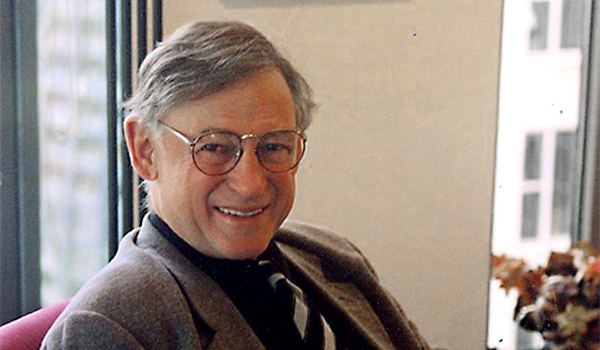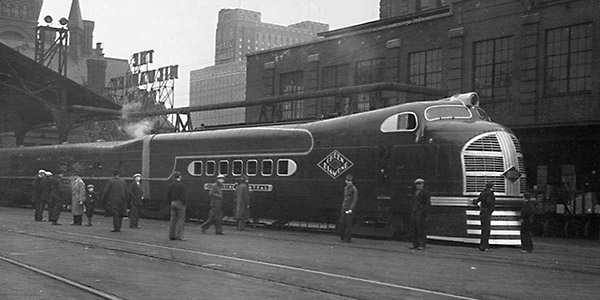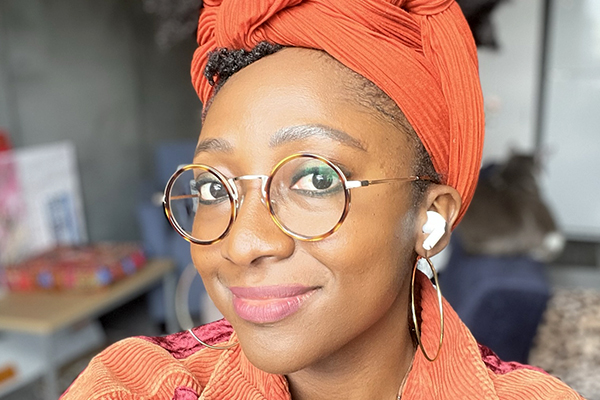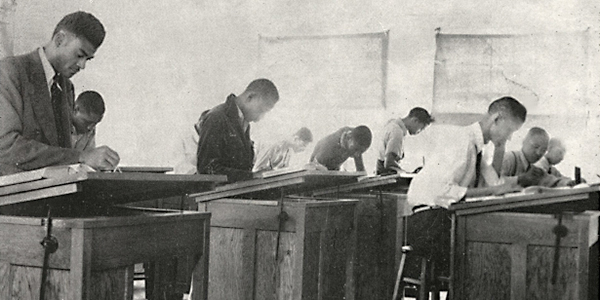New Dennis Shapiro Graduate Fellowship supports doctoral research on the History of the African-American Experience of Technology
HASTS PhD student Kelcey Gibbons is the inaugural recipient.

L. Dennis Shapiro '55; photograph courtesy of the Shapiro family
“This fellowship helps to cement MIT’s leadership in the history of technology by supporting the best and brightest of our graduate students. We are truly grateful to Dennis for his foresight in supporting this important area of scholarship.”
— Deborah Fitzgerald, Leverett Howell and William King Cutten Professor of the History of Technology; STS Program Head, 2021-2022
The Program in Science, Technology, and Society (STS) has announced the creation of the L. Dennis Shapiro (1955) Graduate Fellowship in the History of African-American Experience of Technology. Made possible by a generous gift from MIT alumnus L. Dennis Shapiro ’55, SM ’57, the fellowship supports a PhD student to study the history of African-Americans’ engagement with technology, including invention, use, engineering, cultural innovation, and creativity.
“This fellowship will help cement MIT’s leadership in exploring the history of technology by supporting the best and brightest of our graduate students,” says STS Head Deborah Fitzgerald, noting that the fund provides the selected student with a summer research stipend and research support, renewable for up to three years, and is accompanied by a program fund for related STS activities. “We are truly grateful to Dennis for his foresight in supporting this important area of scholarship.”
The inaugural recipient of the fellowship, Kelcey Gibbons, is enrolled in MIT’s doctoral program in History; Anthropology; and Science, Technology, and Society (HASTS). Her research centers on the history of Black computer professionals and Black technological education in the 20th century. “The feeling that MIT has invested in me and my research has been really encouraging,” Gibbons says.

The "Green Diamond," one of the trains of The Great Migration; running between St. Louis and Chicago
“Historians are just becoming aware of the crucial role of technology in African-American experience, including overlooked black inventors, the skills of enslaved artisans, the centrality of railroads in the Great Migration, the emergence of jazz in the machine age, and so much more. There are countless stories to be discovered on this topic.”
— David Mindell, Dibner Professor of the History of Engineering and Manufacturing, STS; Professor of Aeronautics and Astronautics
A broader view of history
Shapiro, an electronics engineer and inventor with a longstanding interest in American history, endowed the fellowship shortly before his death in February 2021. A veteran of the Air Force, Shapiro was the founder of Aerospace Research, later renamed Aritech, and served as chair and CEO of Lifeline Systems Inc., a maker of medical alert devices that was acquired by Royal Philips Electronics. Those leadership roles led him to an interest in U.S. presidents, which inspired his broader interest in American history.
He was “just a remarkably curious, intellectual, interested engineer,” says longtime friend David Mindell, Dibner Professor of the History of Engineering and Manufacturing in STS and a professor of aeronautics and astronautics. Mindell proposed the idea of the fellowship, in part because he believed it could help fill a gap in historical scholarship — a goal Shapiro would appreciate.
“Historians are just becoming aware of the crucial role of technology in African-American experience, including overlooked black inventors, the skills of enslaved artisans, the centrality of railroads in the Great Migration, the emergence of jazz in the machine age, and so much more,” Mindell says. “There are countless stories to be discovered on this topic.”
Shapiro’s widow, Susan, says the fellowship focus appealed to her and her husband in part because they had some experience of the challenges faced by those outside society’s central power structures. “Dennis grew up in a community with a lot of anti-Semitism, she said. "He grew up in a community where he was, in a certain sense, marginalized. And I was a lawyer at a time when women didn’t become lawyers.” (Susan Shapiro is a 1965 graduate of Harvard Law School, and a retired partner at the law firm, Ropes and Gray.) “One of the beauties of exploring history is that you find resonances among different groups of people where at first you might not see similarities. That helps us, despite differences, to recognize our common ground as human beings."

Kelcey Gibbons, HASTS doctoral student; photo courtesy of Gibbons
The inaugural recipient of the fellowship, Kelcey Gibbons, is a PhD student in the doctoral program in History; Anthropology; and Science, Technology, and Society (HASTS). Her current historical research focuses on how technologists were trained at historically Black colleges and the ways in which Black culture and technology have shaped one another.
Meet Kelcey Gibbons
Mindell suggested the fellowship at a time when he also had a potential recipient in mind: Gibbons was a “terrific student” in his fall 2020 class STS.340 Introduction to the History of Technology. “Within two days of having her in class, I knew this was someone who has the core of what it takes to succeed at MIT and in an academic career,” Mindell says.
Gibbons began her undergraduate education at the Community College of Philadelphia, then transferred to the University of Pennsylvania, where she majored in science, technology, and society and minored in digital humanities. It was there, in a class on the Information Age, that she discovered her current research interest. Gibbons recalls: “I asked the professor what role computing had in the Civil Rights Movement, and she said, ‘If you want to know, you’ll have to figure it out.’”
Gibbons took the professor at her word and wrote her senior honors thesis on the history of African-American computing communities. A chapter from the thesis is now slated to be published this August in an edited volume: Abstractions and Embodiments: New Histories of Computing and Societies (Johns Hopkins Press, 2022). “It’s a cool book. I’m really happy to be a part of it,” Gibbons says.
Gibbons is also delighted to be the recipient of the Shapiro fellowship, which has given her a boost of confidence and a crucial sense of connection to the MIT community. "It can be lonely to be a Black woman in Cambridge," she says. "The fellowship has been a huge boon. I feel more confident to make risks with my writing and thinking.”

Photo of a Mechanical Drawing Class in the 1943 issue of the Prairie View Standard; reproduced with the kind permission of the Special Collections / Archives Department; John B. Coleman Library; Prairie View A&M University; Prairie View, Texas
“How can we understand technology as part of Black culture, and shaped by Black culture — a culture that is happening in a context with racist structures?”
— Kelcey Gibbons, PhD student in HASTS, on the goals of her research
An Institute priority
Gibbons’ research now centers on how technologists were trained at historically Black colleges and the ways in which Black culture and technology have shaped one another. While she is just beginning her doctoral journey, she says she is asking such questions as: “How can we understand technology as part of Black culture, and shaped by Black culture — a culture that is happening in a context with racist structures?”
In another project, Gibbons is exploring using soundscapes as a way to investigate how people think about and consume information. “I’m working on a self-ethnographic, sonic-based project focused on ways of listening in different spaces,” she says, noting that this work was inspired in part by her love of radio programs. “MIT sounds different from Central Square, which sounds different from Dorchester.”
Gibbons is also working with Craig Wilder, the Barton L. Weller Professor of History, on the "MIT and Slavery" research project, an ongoing investigation of the historical connections between the American slave economy, the Atlantic slave trade, and the development of MIT. "Students in the 'MIT and Slavery' course are documenting how slavery contributed to the career of William Barton Rogers (the founder of MIT), how it influenced the establishment and early success of the Institute, and the fields of science and engineering.
Wilder’s work on this project, which began in 2017, has led to a number of MIT initiatives. “It’s become an Institute priority to put more into African-American history,” Mindell says, adding that the STS Shapiro Fellowship is a great example of the work under way. Susan Shapiro says it’s gratifying to be able to support this emerging scholarship. “I’m happy Dennis is being remembered in this way,” she says. “He’s left a legacy.”
Suggested links
Tributes to L. Dennis Shapiro '55
IEEE | Tribute to Dennis Shapiro + In Memoriam | Pi Lambda Phi
Kelcey Gibbons
Website + MIT HASTS page
Program in Science, Technology, and Society
MIT HASTS
SHASS doctoral program in History; Anthropology; and Science, Technology, and Society
Deborah Fitzgerald
Leverett Howell and William King Cutten Professor of the History of Technology; STS Program Head, 2021-2022
David Mindell
Dibner Professor of the History of Engineering and Manufacturing, STS; Professor of Aeronautics and Astronautics
Craig Steven Wilder
Barton L. Weller Professor of History
MIT and Slavery Project
Story prepared by MIT SHASS Communications
Writer: Kathryn O'Neill
Editorial and Design Director: Emily Hiestand
Published 22 April 2022